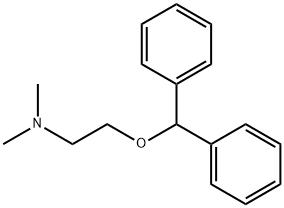Diphenhydramine: Overview, Activities and Dosage
Feb 29,2024
General Description
Diphenhydramine is a widely used first-generation antihistamine for treating symptoms of allergies and the common cold. It can alleviate sneezing, coughing, runny nose, watery eyes, and itching. It is also used as a sleep aid due to its sedative properties. Diphenhydramine is available in various forms and is often combined with other medications for comprehensive relief. However, it is important to be aware of potential side effects such as sedation and dry mouth. It is primarily used as an antihistamine but also has inhibitory effects on the central nervous system, making it useful for sedation and as an antiemetic for motion sickness. Proper dosage and usage instructions should be followed, especially when administering to children.

Figure 1. Diphenhydramine
Overview
Diphenhydramine is a first-generation antihistamine widely used to alleviate symptoms associated with allergic rhinitis and the common cold, such as sneezing, coughing, runny nose, watery eyes, and itching. Additionally, its sedative properties make it suitable for use as a mild sleep aid. When administered intravenously, it is employed in the treatment of severe allergic reactions and anaphylaxis. Belonging to the ethanolamine class of antihistamines, it was the first antihistamine approved for use in the United States in 1946 and continues to be widely utilized today. Available in various generic forms, including tablets, capsules, liquid oral and intravenous solutions, creams, and syrups, it is often found over the counter. Commonly known by the brand name Benadryl, diphenhydramine is frequently combined with other analgesics or sympathomimetic agents for comprehensive relief from symptoms of allergic rhinitis and the common cold. Adult oral dosage typically ranges from 25 to 50 mg, three to four times daily. However, it is important to be aware of potential side effects, including sedation, impairment of motor function, confusion, dizziness, blurred vision, dry mouth, palpitations, and gastrointestinal discomfort. It should be noted that antihistamines can exacerbate urinary retention and glaucoma. 1
Activities
Diphenhydramine is a classical H1 receptor antagonist and an early member of the amino ether class of drugs. It is primarily used as an antihistamine for the treatment of acute allergic reactions, such as urticaria, allergic rhinitis, pruritus, drug-induced skin rash, angioedema, and contact dermatitis. Additionally, diphenhydramine has strong inhibitory effects on the central nervous system, making it useful for sedation and anesthesia premedication. Furthermore, diphenhydramine is also a commonly used antiemetic drug that can be used to treat motion sickness and vomiting induced by various causes. Its mechanism of action is related to its role as an H1 receptor antagonist, which blocks neurotransmitters involved in vomiting. Combined with 8-chlorotheophylline, diphenhydramine becomes meclizine, also known as Bonine, which is a well-known medication used to prevent motion sickness. Therefore, diphenhydramine is a versatile drug that can be used to treat a variety of conditions, from allergies to motion sickness, making it an important medication in many medical settings. 2
Dosage
Diphenhydramine is a medication used to treat cold and allergy symptoms. To ensure its proper usage, it is important to follow the instructions provided on the label or as prescribed by your doctor. It is crucial not to exceed the recommended dosage or use it for a longer duration than advised. For children younger than 2 years old, diphenhydramine should not be administered without consulting a doctor. Cough or cold medicines should also be given to children only after seeking medical advice as misuse can be fatal in young children. Diphenhydramine should not be used to induce sleepiness in children. Liquid medicine should be measured using a special dose-measuring spoon or medicine cup. If one is not available, consult your pharmacist for an appropriate measuring device. For motion sickness, take diphenhydramine 30 minutes before being exposed to motion sickness triggers, such as long car rides, airplane or boat travel, or amusement park rides. Continue taking diphenhydramine with meals and at bedtime as long as you anticipate being in a motion-sickness situation. As a sleep aid, take diphenhydramine within 30 minutes before going to bed. If your symptoms do not improve after 7 days of treatment or if you experience a fever accompanied by a headache, cough, or skin rash, contact your doctor. It is important to inform any treating physician that you are using diphenhydramine as it can affect the results of allergy skin tests. Store diphenhydramine at room temperature, away from moisture and heat. 3
Reference
1. Diphenhydramine. In: LiverTox: Clinical and Research Information on Drug-Induced Liver Injury. Bethesda (MD): National Institute of Diabetes and Digestive and Kidney Diseases; January 16, 2017.
2. Diphenhydramine. In: Mother To Baby | Fact Sheets. Brentwood (TN): Organization of Teratology Information Specialists (OTIS); January 2023.
3. Sanjai Sinha, MD. Diphenhydramine. Drugs. 2023.
- Related articles
- Related Qustion
- Diphenhydramine: mechanism of action, clinical applications and side effects Aug 16, 2023
Diphenhydramine is an antihistamine drug that treats allergies, itching, sleep disorders and has side effects and precautions.
- The toxity of Diphenhydramine Oct 14, 2021
Diphenhydramine is a first-generation antihistamine that works at the H-1 receptors. It was first synthesized in 1943 by Dr George Rieveschl of the University of Cincinnati.
Supplementation with pyridoxal 5'-phosphate monohydrate can synthesize neurotransmitters such as dopamine and serotonin, maintaining a healthy nervous system.....
Nov 4,2025Biochemical EngineeringCollagen's triple helix, mimicked by synthetic methods like collagen-related peptides, holds promise in wound healing and tissue repair with potential biomedical applications.....
Feb 29,2024APIDiphenhydramine
58-73-1You may like
- Diphenhydramine
-

- 2025-12-13
- CAS:58-73-1
- Min. Order:
- Purity: 0.99
- Supply Ability:
- Diphenhydramine
-

- $10.00 / 1KG
- 2025-12-11
- CAS:58-73-1
- Min. Order: 1KG
- Purity: 99%
- Supply Ability: 100 mt
- Diphenhydramine
-

- $55.00 / 500mg
- 2025-12-10
- CAS:58-73-1
- Min. Order:
- Purity: 99.49%
- Supply Ability: 10g






